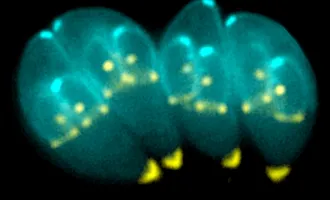Journal Club: Immunology, Cancer Biology, Fetal Surgery & Immunology, and Infectious Disease.
IMMUNOLOGY: Costimulatory molecule DNAM-1 is essential for optimal differentiation of memory natural killer cells during mouse cytomegalovirus infection. Nabekura, T., et al. (Lanier). Immunity. 2014 Jan 14. Epub ahead of print.
A pathogen that doesn’t kill us often makes our immune system stronger, with subsequent responses to the pathogen being more rapid and efficacious. This immune memory has traditionally been thought to reside only in T-cells and B-cells.
In recent years, however, it has become apparent that under certain conditions, NK cell-associated memory is also possible. Although it is clear that mouse cytomegalovirus (MCMV) infection can produce memory natural killer (NK) cells, the signaling mechanisms necessary for this protocol remain incompletely defined.
In this paper, researchers demonstrated that the extracellular protein DNAM-1 is critical to this process. They showed that blocking this protein prevents NK expansion and memory formation in response to MCMV and identified two important downstream signaling cascades, setting the stage for further research into NK cell memory.
CANCER BIOLOGY: BRAFV600E cooperates with PI3'-kinase signaling, independent of AKT, to regulate melanoma cell proliferation. Silva, J.M., Bulman, C., McMahon, M. Mol. Cancer Res. 2014 Jan. 14. Epub ahead of print.
Activating mutations of BRAF are present in the majority of cases of melanoma, the most deadly skin cancer. Recently, targeted therapies for one such mutation, V600E, have entered clinical use.
BRAF mutations are often complemented by disabling mutations in PTEN, which leads to increased PI3'-kinase signaling. In this study, the authors investigated the mechanism of this cooperation.
They showed using both BRAF and PI3'-kinase inhibitors on melanoma cell lines blocked proliferation and decreased protein synthesis better than either alone, even when there were no mutations in the PI3'-kinase pathway, suggesting that combination therapy may be broadly beneficial.
Unexpectedly, they found that inhibition of AKT, which is downstream PI3'-kinase, does not have an anti-proliferative effect, implying that the BRAF and PI3'-kinase cooperation is AKT independent.
FETAL SURGERY & IMMUNOLOGY: Fetal intervention increases maternal T-cell awareness of the foreign conceptus and can lead to immune-mediated fetal demise. Wegorzewska, M., et al. (Mackenzie). J. Immunol. 2014 Jan 15. Epub ahead of print.
Surgery performed before birth has been shown to be an effective treatment for select congenital disorders, such as spina bifida. The benefits of fetal surgery, however, are offset by an increase in the associated risk of preterm labor.
These researchers and others have hypothesized that the trauma of surgery may disrupt the tolerance of the maternal immune system for the fetus and provoke the immune rejection of this genetically distinct individual.
Here, the researchers reported a series of experiments in mice that demonstrated that fetal surgery promotes the accumulation of activated, pro-inflammatory maternal T-cells that recognize the fetus. Although further research, for example confirming a similar effect in humans, remains to be done, these findings suggest that immune-dampening therapy may be a useful adjunct to fetal surgery.
INFECTIOUS DISEASE: Strong relationship between oral dose and tenofovir hair levels in a randomized trial: hair as a potential adherence measure for pre-exposure prophylaxis (PrEP). Liu, A.Y., et al. (Gandhi). PLoS One. 2014. 9(1):e83736.
In recent years, a series of studies have shown that daily oral antiretroviral therapy including tenofovir can significantly decrease the risk of HIV infection in individuals at high risk, a practice known as pre-exposure prophylaxis (PrEP).
At the same time, these studies have demonstrated that high levels of regimen adherence are necessary to accurately evaluate PrEP trials. Individuals with poor adherence cannot be relied on to acknowledge this, and blood testing, while accurate, is invasive and difficult in resource-poor settings.
In this phase I study, HIV-negative adults followed one of three dosing frequencies of tenofovir for six weeks, followed by collection and analysis of hair samples. Tenofovir levels in hair were found to vary in proportion to dosing frequency, suggesting that this may be an effective means of PrEP adherence monitoring.


